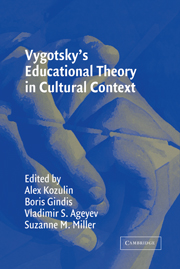Book contents
- Frontmatter
- Contents
- List of Contributors
- Series Foreword
- Introduction: Sociocultural Theory and Education: Students, Teachers, and Knowledge
- PART I CONCEPTS AND PARADIGMS
- PART II DEVELOPMENT AND LEARNING
- PART III SOCIOCULTURAL THEORY APPLICATION IN THE CLASSROOM
- PART IV DIVERSE LEARNERS AND CONTEXTS OF EDUCATION
- 16 Intrapersonal Communication and Internalization in the Second Language Classroom
- 17 Mediation in Cognitive Socialization
- 18 Cultural Modeling
- 19 The Relations of Learning and Student Social Class
- 20 Vygotsky in the Mirror of Cultural Interpretations
- Author Index
- Subject Index
- Titles in the series
- References
20 - Vygotsky in the Mirror of Cultural Interpretations
Published online by Cambridge University Press: 05 June 2012
- Frontmatter
- Contents
- List of Contributors
- Series Foreword
- Introduction: Sociocultural Theory and Education: Students, Teachers, and Knowledge
- PART I CONCEPTS AND PARADIGMS
- PART II DEVELOPMENT AND LEARNING
- PART III SOCIOCULTURAL THEORY APPLICATION IN THE CLASSROOM
- PART IV DIVERSE LEARNERS AND CONTEXTS OF EDUCATION
- 16 Intrapersonal Communication and Internalization in the Second Language Classroom
- 17 Mediation in Cognitive Socialization
- 18 Cultural Modeling
- 19 The Relations of Learning and Student Social Class
- 20 Vygotsky in the Mirror of Cultural Interpretations
- Author Index
- Subject Index
- Titles in the series
- References
Summary
When Vygotsky's theory became accessible to American scholars, it was interpreted, understood, and further developed according to American cultural and intellectual traditions. American scholars contributed much to the creative development of his ideas on all levels: theory, research, and applications. They also played a crucial role in spreading his ideas throughout the world. In this chapter, however, I will be dealing, predominantly, with some cultural biases in understanding Vygotsky's ideas. As Alex Kozulin (2002, personal communication) recently noticed:
On one hand, American scholars were instrumental in acquainting English speaking audiences with Vygotsky's ideas, on the other hand, in the process of this acquaintance Vygotsky's ideas underwent a rather strong Americanization. This trend became clear already when the first (abridged) translation of Vygotsky's Thought and Language edited by Bruner appeared in 1962 (Vygotsky, 1962). While empirical aspects of Vygotsky's work were retained, almost all poetic, philosophical and historical images were purged from this edition.
I have been fortunate in having firsthand experience with Vygotsky's ideas both in Russia and in America, first as a student and professor in Russia, and then as a professor in the United States. Many years of teaching courses on Vygotsky in the School of Psychology at Moscow State University and several years of teaching Vygotsky-related courses in American graduate schools of education have provided me with excellent materials on how different interpretations of his ideas can be. These variations go far beyond any individual differences – however wide the scope of individual differences may be.
- Type
- Chapter
- Information
- Vygotsky's Educational Theory in Cultural Context , pp. 432 - 450Publisher: Cambridge University PressPrint publication year: 2003
References
- 23
- Cited by



